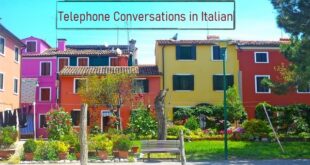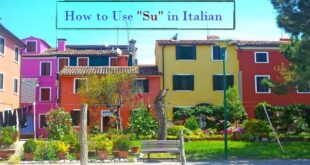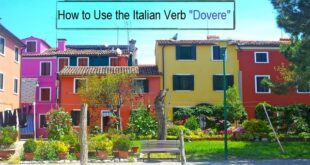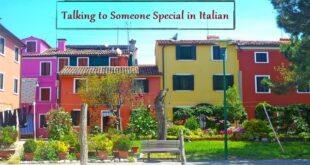Say “I’ll take care of it” in Italian with Subject – Verb Inversion Certain situations may require clarification of an individual’s responsibility to family members, friends, or co-workers. This leads to common phrases used on a daily basis. For instance, “I’ll take care of it,” can be rendered in Italian by a unique sentence structure using a verb of action and also with the reflexive verb occuparsi. When in Italy, a simple way to emphasize that you will take responsibility for an action is to make a short statement and place the subject pronoun after the verb; in effect, …
Read More »How to say “some” (Part 1)
Say “Some” in Italian with the Partitive To speak fluently in another language, it is important to know how to describe a group of things in a general way. In some cases, the number of things in a group can be counted, but we may want to describe only a part of the entire group. In other cases, the number of things in a group cannot be counted — either due to difficulty in dividing the group into individual parts or due to a seemingly infinite number of things within the group. In short, all languages bypass the problem of …
Read More »Telephone conversations
Italian Telephone Phrases to Use with Friends Once one is in Italy to visit relatives or friends, and especially for business, it is important to know both the familiar and polite Italian phrases used to initiate a telephone conversation. When making a telephone call to a friend, two common greetings are used, depending on how well the friends know each other. Pronto. Sono Caterina. Ready. (for hello) I am Kathy. Pronto. Sono io! Ready. (for hello) It’s me! (lit. It is I!) In some households in Italy, landlines are still in use. In this case, of course, one needs …
Read More »Using the preposition “su”
“Su” in reference to a place: Physical Position: “On” “On top of” The Italian preposition “su” means “on“ and provides a literal description of one’s physical location or movement upward. The concept is simple: if someone or something is “on” something, it is above that thing, often connected to it in some way, but usually able to be removed and repositioned. As with other prepositions, su is combined with the definite article for the noun that follows and in this case, describes what the subject is “on.” The combination means, “on the” or “on top of the.” Of course, an …
Read More »How to use the verb “dovere”
The Italian verb dovere fills an essential role in everyday life, whether one is a traveler to Italy or is speaking to an acquaintance, friend, or family. Dovere is used as a helping verb to emphasize the obligation or the need to complete an action with its meanings of “to have to,” or “to must.” Think of how many times a day we say we “have to” or “must” do something — leave for work or school, run an errand, meet a friend we haven’t seen in a while — the permutations are endless! Also, it is important to note …
Read More »Talking About Emotions (2)
Talking about one’s emotions is complex, both in one’s native language and certainly in an adopted language. In Italian, many phrases used to convey emotion are idiomatic, and the choice of verbs can differ with even minor differences in a situation. For instance, an upcoming event may make one happy and generate positive feelings of excitement and anticipation. Although it is nice to have something to look forward to (as we discussed in Part 1 of this series about emotions last year), given the repetitiveness of daily life, we all feel bored at one time or another. It is a …
Read More »Talking to someone special
Meeting someone at a gathering — Piacere di conoscerla… Where do two people who form a lasting relationship have their first encounter? Many times soon-to-be couples are introduced by a friend, often at a festa (party). The Italian verb conoscere is used when two people first meet. In a previous blog, The Holidays in Italy, we discussed the many variations of friendly Italian introductions, and the most common reply, “Piacere di conoscerla,” for, “It is a pleasure to meet you.” This phrase uses the formal “la” to mean “you.” More commonly, though, and especially at informal gatherings of young people, the familiar …
Read More »“Dare” and verbs of giving
The Italian verb dare is most often used with the meaning “to give,” or literally, “to hand over” something to someone else. When the object “handed over” is a gift, dare may be used to describe this action or the more specific verbs of gift-giving may come into play, such as regalare (to give a gift) and donare (to donate). To truly sound like a native Italian, learn the quintessential Italian interjection, “Dai!” from the second person conjugation of dare. The Italian verb dare is also an integral part of an important Italian expression, “dare del tu,” which allows one to …
Read More »Christmas giving in Italy
We’ve discussed Italian Christmas traditions in December each year since this blog’s inception. As noted before, the Christmas season in Italy lasts from the beginning of December until after the New Year. Below are the important dates to remember for those celebrating Christmas in Italy, along with Italian greetings for each holiday. To follow is the story of La Befana, the friendly Italian witch with gifts for all. The Italian Christmas Season L’Immacolata Feast of the Immaculate Conception: Catholic holiday that celebrates mother Mary. La Vigilia di Natale Il Natale Christmas Eve Christmas Buon Natale! Buone Feste! Merry Christmas! Happy …
Read More »Expressing Emotion in Italian
Expressing one’s emotions is complex, both in one’s native language and certainly in an adopted language. In Italian, many phrases used to convey emotion are idiomatic, and the choice of verbs can differ with even minor differences in a situation. This is especially true for the winter holiday season, which brings with it happiness and anticipation, and many ways to express these feelings in Italian! In short, we must learn to think in Italian if we are to communicate our emotions in Italian! Expressing Happiness in Italian — Contento, Felice, Piacere Sono contento(a) di… If an Italian is happy, he …
Read More » Fra Noi Embrace Your Inner Italian
Fra Noi Embrace Your Inner Italian











